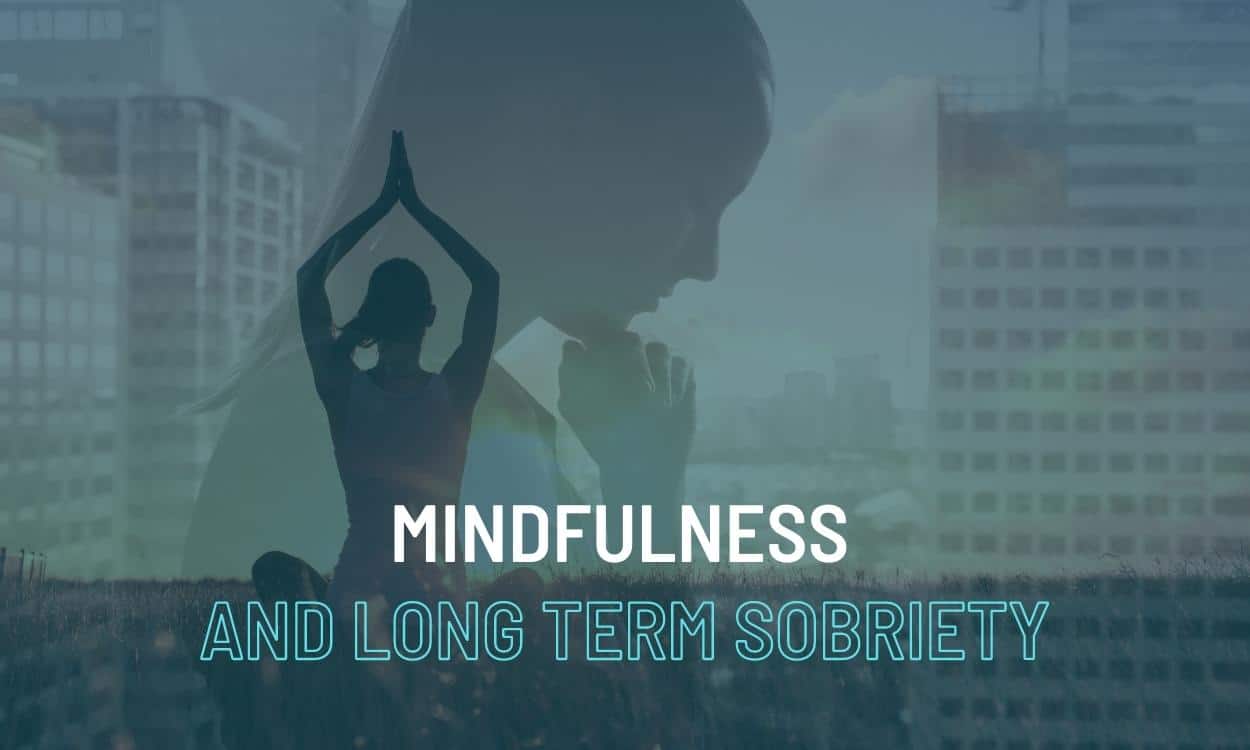Mindfulness and long-term sobriety from substance use disorders are two things that can go hand-in-hand with one another. When you’re mindful, you’re living in the present. You’re not letting the mistakes or events of the past define you. You’re also not worrying about the future. You’re thinking about what’s happening at the moment.
When you go to a treatment program for addiction, your program might include mindfulness practices like meditation.
Many people feel that their ability to use mindfulness has strengthened their long-term recovery process and made their path in sober life more attainable.
Short-Term vs. Long-Term Sobriety
For people in recovery, there are two types of sobriety. There’s short-term sobriety, and then there’s long-term sobriety. Neither is better or worse than the other—they reflect different points in your recovery journey. As you progress, the risk of relapse does tend to go down in your everyday life of sobriety.
When you’re in the early stages of recovery, you’ve done hard work and gotten to an amazing point. However, it’s all new to you. In early recovery, you are often learning how to live again. It may have been years or even decades since you’ve experienced life without the influence of alcohol or drugs.
That’s why you’re often told to take it one day at a time.
Early recovery can be tenuous as you navigate new feelings and experiences and let go of the life you knew. Your primary focus is often on relapse prevention and keeping up with therapy and 12-step programs.
Addiction changes your brain in significant ways. Your brain is recovering in early sobriety, and your body and spirit are healing. You’re working on developing coping skills and avoiding triggers. When you encounter triggers in early recovery, you think about how you can manage those in the best ways.
Different people characterize long-term sobriety in different ways. For some people, the period of sustained recovery is from years one to five after you get sober. Then, long-term, stable sobriety might be at any point over five years.
However you define it, long-term sobriety is when you feel more confident in your recovery and regularly use all the positive coping mechanisms you’ve learned. You often have a fulfilling career, a steady home environment and a social support network, and a generally healthy lifestyle. You’ll be able to manage the symptoms of any co-occurring mental health issues well, and you’ll take care of your physical health in the later stage of recovery.
Getting to that point isn’t easy, but it is worth it, and mindfulness can be part of your path and a way to maintain your sobriety throughout the rest of your life.
What is Mindfulness?
Mindfulness, much like sobriety and recovery from addiction, can mean different things to everyone. Though, mindfulness is a sense of awareness of your experience, without judgment. Mindfulness isn’t a personality trait or feature of who you are—instead, it’s a state of being.
You can bring on the state of mindfulness through practice and personal growth. We often associate that practice with meditation, but that doesn’t have to be the case. Although mindfulness and meditation are often used together, they aren’t the same things.
- Mindfulness isn’t something temporary that occurs only during meditation. It’s a way of living, instead.
- When you develop the skill of mindfulness, you can take a step back in any situation, and you’re present and aware.
- When you’re in a mindfulness state, you’re paying attention, purposeful, and in the present moment. You’re focusing your conscious attention on the here and now.
- You’re aware of your feelings and thoughts, but you’re not caught up in them.
- When you teach your mind to be present, you aren’t captive to reactive feelings or thoughts.
- Mindfulness is helpful when you face a challenge or difficult situation.
Mindfulness doesn’t eliminate worries, stress, or problems in your life. Instead, you choose how you handle whatever is happening at any given moment. Being mindful also doesn’t mean you’re never angry or upset. You’re just thoughtful in your response to those feelings.
The Role of Mindfulness Meditation
While we pointed out above that mindfulness and meditation aren’t the same thing, meditation is the best way to begin to learn how to be mindful.
When you practice mindfulness meditation, it changes the shape of your brain.
- Imaging-based research shows this type of meditation can help rewire your brain, so you focus more on positive thoughts and emotions rather than negative ones.
- When you meditate, you can move to lower-frequency brain areas, which activate and deactivates certain regions of the brain.
- Meditation can help you build new pathways in the areas of your brain that are responsible for traits like decision-making and focus.
- Mindful meditation can change the shape of your brain through something known as neuroplasticity. The gray matter in your brain, which is responsible for emotional regulation and problem-solving, and the area responsible for learning and memory, increases with regular meditation. The amygdala, which regulates fear, stress, and anxiety, decreases.

The Benefits of Mindfulness for Long-Term Sobriety
When it comes to maintaining sobriety and successful recovery, learning to be mindful is powerful. Some of the positive impacts of being mindful as far as maintaining long-term sobriety include:
- You’re better equipped to deal with stress when you’re present and mindful. When you were in active addiction, stress could have been why you started using alcohol or drugs, to begin with. It’s common to self-medicate when you have an addiction. When you’re in recovery, as you learn to be mindful, you learn new ways to deal with stress.
- Being mindful is a good way to cope with mental health disorders like depression and anxiety symptoms. When you can break negative thought patterns, you can reduce your symptoms.
- You’re more aware of your feelings and thoughts, which can improve your decision-making. You’re focusing on making decisions that will have a positive effect on your life and the people around you.
- Cravings are difficult, especially early in recovery. Being mindful helps you recognize your cravings and realize it’s okay to feel them but that you don’t have to give into them.
- When you’re present and a more mindful person, you can spot warning signs within yourself that could be triggers for relapse and then change course before actually returning to substance abuse.
- When you first get sober, you can use a practice of being mindful to start to label or name your thoughts or emotions that take away from your feelings of peace and your sobriety. The more you can label your thoughts, the less likely you will engage in them.
- Mindfulness meditation can help you reduce some of the inner noise within yourself. You can calm that chatter that could otherwise make you feel anxious or out of control.
- Focusing on your mental health through being mindful is a good way to begin building healthy habits in your life. Healthy habits are essential for success in recovery from substance use.
A mindful practice is something you should work on cultivating every day for maintaining long-term sobriety.
If you’d like to learn more about addiction treatment programs and options to get you on a mindful and long-term sobriety path, confidentially get in touch with the Opus Health team today by calling 858-465-7722.




